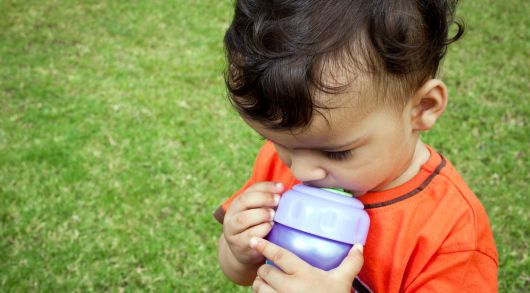As a mother, your baby’s health and well being are undoubtedly your top priorities. All your decisions, from feeding routines to nurturing their emotional needs, are centred around ensuring your little one gets the best care possible. However, when it comes to introducing water, it’s natural to have questions: When to introduce water to the baby? What is the right quantity of water for 6 month baby in ml? How to introduce water to my baby?
This blog covers everything you need to know about safely incorporating water into your baby’s diet.
When Should I Start Giving My Baby Water?
The American Academy of Pediatrics (AAP) recommends that babies should not be given water before they are 6 months old. Before this age, the babies get all the hydration they need from breast milk or formula. In fact, giving water to babies younger than 6 months can be harmful, as it may lead to water intoxication, interfere with nutrient absorption, or reduce the baby's appetite for nutrient-rich breast milk or formula.
When Can Babies Start Drinking Water?
The American Academy of Pediatrics (AAP) recommends that babies should not consume water before they turn 6 months. Here's a breakdown of water intake guidelines by age:
- 0-6 months: Exclusive breast milk or formula
- 6-12 months: Small amounts of water, in addition to breast milk or formula
- 12+ months: Water as a regular part of the diet
Quantity of Water for 6-Month-Old Babies in ml
Once your baby reaches 6 months, you can start introducing small amounts of water. But how much is appropriate?
The quantity of water for 6 month baby in ml is typically around 60-120 ml (or 2-4 ounces) per day. This amount should be offered in addition to breast milk or formula, not as a replacement. The water consumption amount can be gradually increased to 4-8 ounces (120-240 ml) by the time they are 12 months old.
However, please be aware that this is just a general guideline. The exact amount may vary depending on multiple factors such as:
- The baby's size and weight
- Climate and temperature
- Amount of physical activity
- Frequency of breastfeeding or formula feeding
- Types and amounts of solid foods introduced, etc.
The next obvious question is, how to introduce the baby to water? Let’s discuss that.
How to Introduce Water to Your 6-Month-Old
Introducing your baby to water can be an exciting milestone. However, it is important to do it gradually and thoughtfully. Here are a few practical tips to do so:
- Choose the right cup: Start by offering water in a sippy cup or small, open cup that is designed for babies. For 6-months old babies, these types of cups would be easier to grasp, sip, and drink independently.
- Introducing water during mealtimes: As First solid foods are introduced, offer water to your baby after meals. This helps your baby to understand that drinking water goes hand-in-hand with eating.
By following these tips, you can introduce water to your 6-month-old in a way that supports their growth and development without overwhelming their system. If you are still wondering how to know if your baby is well-hydrated, here are a few signs:
- 6-8 wet diapers every 24 hours
- Clear or pale yellow urine
- Moist lips and mouth
- Alert and active behaviour
- Tears when crying
When to Be Cautious with Water Intake
While the prescribed water intake is important for the babies, it is also equally important to ensure the water intake is not too much. Excessive water intake could be fatal to your baby. Here is how:
- Water intoxication: Consuming excessive water can cause dilution of sodium in the body. This potentially causes seizures, coma, or even death.
- Reduced appetite: Filling up on water might decrease your baby's intake of breast milk or formula and thereby reduces the intake of nutrients.
Conclusion
Knowing the amount of water your 6 month old infant needs (around 60 to 120 ml daily) is important for mothers who are new to parenthood. And it is critical to keep in mind that water should be a supplement and not a substitute for breast milk or formula during the year. When it comes to managing your baby's intake requirements, rely on your instincts and seek guidance from your paediatrician, for tailored recommendations. By sticking to these tips and tuning in to your infants signals, you'll make sure your little one remains well, quenched, and content as they develop and grow.

